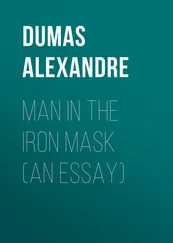George Dover - The True History of the State Prisoner, commonly called the Iron Mask
Здесь есть возможность читать онлайн «George Dover - The True History of the State Prisoner, commonly called the Iron Mask» — ознакомительный отрывок электронной книги совершенно бесплатно, а после прочтения отрывка купить полную версию. В некоторых случаях можно слушать аудио, скачать через торрент в формате fb2 и присутствует краткое содержание. Жанр: foreign_antique, foreign_prose, на английском языке. Описание произведения, (предисловие) а так же отзывы посетителей доступны на портале библиотеки ЛибКат.
- Название:The True History of the State Prisoner, commonly called the Iron Mask
- Автор:
- Жанр:
- Год:неизвестен
- ISBN:нет данных
- Рейтинг книги:5 / 5. Голосов: 1
-
Избранное:Добавить в избранное
- Отзывы:
-
Ваша оценка:
- 100
- 1
- 2
- 3
- 4
- 5
The True History of the State Prisoner, commonly called the Iron Mask: краткое содержание, описание и аннотация
Предлагаем к чтению аннотацию, описание, краткое содержание или предисловие (зависит от того, что написал сам автор книги «The True History of the State Prisoner, commonly called the Iron Mask»). Если вы не нашли необходимую информацию о книге — напишите в комментариях, мы постараемся отыскать её.
The True History of the State Prisoner, commonly called the Iron Mask — читать онлайн ознакомительный отрывок
Ниже представлен текст книги, разбитый по страницам. Система сохранения места последней прочитанной страницы, позволяет с удобством читать онлайн бесплатно книгу «The True History of the State Prisoner, commonly called the Iron Mask», без необходимости каждый раз заново искать на чём Вы остановились. Поставьте закладку, и сможете в любой момент перейти на страницу, на которой закончили чтение.
Интервал:
Закладка:
Baron George Agar Ellis Dover
The True History of the State Prisoner, commonly called the Iron Mask / Extracted from Documents in the French Archives
PREFACE
I was led to undertake the following Narrative by the perusal of a work, lately published at Paris, entitled “Histoire de L’Homme au Masque de Fer, par J. Delort;” in which the name of that state prisoner is most clearly and satisfactorily ascertained, by means of authentic documents.
Under these circumstances, it may be asked why I was not contented to leave the question, thus set at rest, in the hands of M. Delort, who had the original merit of the discovery: – to this I would answer, that M. Delort’s part of the book struck me as peculiarly ill arranged and confused; besides being unnecessarily filled with the most fulsome flattery of Lewis the Fourteenth, never, certainly, more inappropriately bestowed, than while in the act of recording one of the most cruel and oppressive acts of that Sovereign’s cruel and oppressive reign.
I have also thought, that the subject was one of sufficient historical curiosity to interest the English public.
For these reasons, I have been induced to throw together the following chain of evidence upon the subject, making use of the same documents as M. Delort, to which I have added some others previously published, and printing the whole series in an Appendix.
G. A. E. April, 1826.CONTENTS
History of the Iron Mask.
APPENDIX.
No. 1. Estrades to Lewis the Fourteenth.
Commencement of the Negociation. – State of the Court of Mantua. – Influence of the Spaniards there.
No. 2. Matthioli to Lewis the Fourteenth.
Protestations of devotion to Lewis. – Belief in the good intentions of the Duke of Mantua.
No. 3. Estrades to Pomponne.
Continuation of the negociation. – Intrigues of the Austrian Party.
No. 4. Estrades to Pomponne.
Intrigues of the Spaniards to form a league in Italy against France.
No. 5. Pomponne to Estrades.
No. 6. Pomponne to Estrades.
The King’s approval of the negociation.
No. 7. Lewis the Fourteenth to Estrades.
Approval of the negociation. – Answer to the demands of the Duke of Mantua.
No. 8. Lewis the Fourteenth to Matthioli.
No. 9. Estrades to Pomponne.
No. 10. Estrades to Lewis the Fourteenth.
Conference with Matthioli. – Discussion of the demands of the Duke of Mantua.
No. 11. Estrades to Pomponne.
The Duke of Mantua watched by the Spaniards.
No. 12. Estrades to Pomponne.
Impatience of the Duke of Mantua to conclude the Negociation.
No. 13. Estrades to Pomponne.
Plans of the Spaniards. – Dispositions of the Venetian Government.
No. 14. Pomponne to Estrades.
Recommendations of Delay in the Negociation.
No. 15. Estrades to Pomponne.
Information respecting the Dispositions of the Venetians.
No. 16. Estrades to Pomponne.
Fears of the Duke of Mantua.
No. 17. Estrades to Lewis the Fourteenth.
Account of his Interview with the Duke of Mantua. – The latter insists upon sending Matthioli to Paris.
No. 18. Estrades to Pomponne.
Reasons for consenting to the mission of Matthioli to Paris.
No. 19. Estrades to Pomponne.
No. 20. Pomponne to Estrades.
Approval of Matthioli’s Mission to France. – Permission to Estrades to leave Venice.
No. 21. Estrades to Pomponne.
Conversation with Matthioli.
No. 22. Pomponne to Estrades.
No. 23. Estrades to Pomponne.
Means of protracting the Negociation. – Views of Matthioli.
No. 24. Estrades to Pomponne.
Delay in Matthioli’s Journey to Paris.
No. 25. Estrades to Pomponne.
Interview with Matthioli.
No. 26. Pomponne to Estrades.
No. 27. Pomponne to Estrades.
No. 28. Estrades to Pomponne.
Differences between the Duke of Mantua and the Spaniards.
No. 29. Estrades to Pomponne.
Excuses for the delay of Matthioli.
No. 30. Pomponne to Estrades.
No. 31. Estrades to Pomponne.
No. 32. Pomponne to Estrades.
No. 33. Estrades to Lewis the Fourteenth.
Good dispositions of the Duke of Mantua, and of the Garrison of Casale.
No. 34. Pinchesne to Pomponne.
No. 35. Matthioli to Lewis the Fourteenth.
Excuses his own delay.
No. 36. Pinchesne to Pomponne.
No. 37. Pomponne to Pinchesne.
No. 38. Pomponne to Pinchesne.
No. 39. Pinchesne to Pomponne.
Intention of Estrades to leave Venice.
No. 40. Pinchesne to Pomponne.
Continued delay of Matthioli.
No. 41. Pinchesne to Pomponne.
No. 42. Pomponne to Pinchesne.
No. 43. Pomponne to Pinchesne.
No. 44. Pomponne to Pinchesne.
No. 45. Pinchesne to Pomponne.
No. 46. Pinchesne to Pomponne.
No. 47. Pomponne to Pinchesne.
No. 48.
Powers granted to Pomponne, to treat with Matthioli.
No. 49. Lewis the Fourteenth to the Duke of Mantua.
Promises his protection to the Duke.
No. 50. Pomponne to Pinchesne.
No. 51. Pinchesne to Pomponne.
Interview of Pinchesne with Don Joseph Varano.
No. 52. Pomponne to Pinchesne.
A courier sent to Venice with a new cypher.
No. 53. Louvois to Saint-Mars.
Catinat sent to Pignerol.
No. 54. Pomponne to Pinchesne.
D’Asfeld sent to Venice.
No. 55. Pomponne to Pinchesne.
No. 56. Pinchesne to Pomponne.
No. 57. Pinchesne to Pomponne.
No. 58. Pinchesne to Pomponne.
No. 59. Pinchesne to Pomponne.
Arrival of d’Asfeld at Venice.
No. 60. Pinchesne to Pomponne.
Delays of Matthioli, and of the Duke of Mantua.
No. 61. Pinchesne to Pomponne.
Further Delays of Matthioli.
No. 62. Louvois to Saint-Mars.
No. 63. Pinchesne to Pomponne.
Interviews with Matthioli. – Further Delays in the Ratification of the Treaty.
No. 64. Louvois to Saint-Mars.
No. 65. Pomponne to Pinchesne.
No. 66. Pinchesne to Pomponne.
Reasons for the Duke of Mantua’s delay in going to Casale.
No. 67. Pomponne to Matthioli.
No. 68. Pinchesne to Pomponne.
Arrangements for the Exchange of the Ratifications of the Treaty.
No. 69. Pinchesne to Pomponne.
Suspicions of the House of Austria respecting the Negociations.
No. 70. Pinchesne to Pomponne.
Arrest of d’Asfeld. – Departure of the Duke of Mantua from Venice.
No. 71. Pomponne to Matthioli.
Letter of Credence to be presented to Matthioli by Catinat.
No. 72. Estrades to Matthioli.
Complaints of the Delays in the Conclusion of the Negociation.
No. 73. Louvois to Saint-Mars.
No. 74. Pomponne to Pinchesne.
No. 75. Pomponne to Pinchesne.
Suspicions of the Fidelity of Matthioli.
No. 76. Chanois to Louvois.
Reports of Catinat being at Pignerol. – Different Rumours respecting the Negociation.
No. 77. Catinat to Louvois.
No. 78. Catinat to Louvois.
Rumours of Catinat’s being at Pignerol. – Civilities of Saint-Mars to him.
No. 79. Pomponne to Pinchesne.
Continued Suspicions of Matthioli.
No. 80. Louvois to Saint-Mars.
No. 81. Pomponne to Pinchesne.
Confirmation of the Suspicions respecting Matthioli’s want of fidelity.
No. 82. Louvois to Saint-Mars.
Order to receive Matthioli as a Prisoner.
No. 83. Pomponne to Pinchesne.
Further confirmation of the Treachery of Matthioli.
No. 84. Catinat to Louvois.
Arrest of Matthioli.
No. 85. Catinat to Louvois.
Intelligence respecting Matthioli’s Papers.
No. 86.
Inventory sent by Catinat to Louvois, of the Papers which Matthioli had about his person.
No. 87. Catinat to Louvois.
Читать дальшеИнтервал:
Закладка:
Похожие книги на «The True History of the State Prisoner, commonly called the Iron Mask»
Представляем Вашему вниманию похожие книги на «The True History of the State Prisoner, commonly called the Iron Mask» списком для выбора. Мы отобрали схожую по названию и смыслу литературу в надежде предоставить читателям больше вариантов отыскать новые, интересные, ещё непрочитанные произведения.
Обсуждение, отзывы о книге «The True History of the State Prisoner, commonly called the Iron Mask» и просто собственные мнения читателей. Оставьте ваши комментарии, напишите, что Вы думаете о произведении, его смысле или главных героях. Укажите что конкретно понравилось, а что нет, и почему Вы так считаете.












